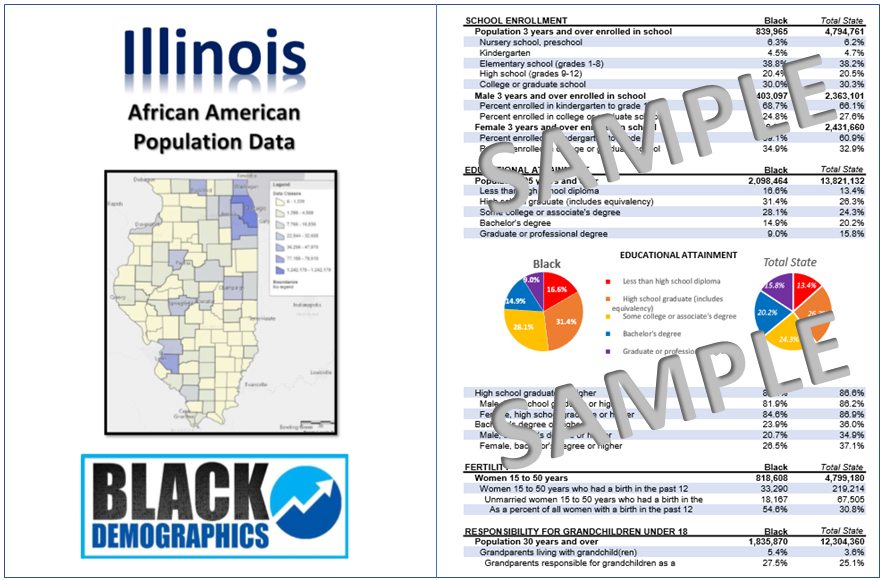Illinois
According to 2020 census data, the Black/African American alone population in Illinois was 1,808,271, which accounts for approximately 14.1% of the state’s total or 1,992,213 (Black in combination with one or more races) 16% population.
| State Data | Black Alone | Total State |
| Population (ACS estimate) | 1,808,271 | 12,671,469 |
| Median household income | $42,118 | 72205 |
| Bachelor’s degree or higher | 25.1% | 37.1% |
| Family poverty rate | 20.2% | 8.6% |
| Percentage households Married-couple families | 21.9% | 46.1% |
| Homeowner rate | 41.2% | 67.5% |
Source: U.S. Census Bureau, 2021 American Community Survey 1-Year Estimates
GROWTH
Between 1990 and 2020, the Black population in Illinois experienced moderate growth, increasing from approximately 1.6 million to over 1.7 million. This growth has been driven by both natural increase and in-migration from other states. As the African American population continues to grow, it has contributed to the political, economic, and cultural landscape of Illinois.
A substantial proportion of Illinois’s African American population resides in the Chicago metropolitan area, where they make up 30% of the city’s population and 18% of the metro population. Other urban areas, such as Peoria, Rockford, and Springfield, also host significant Black populations. Additionally, there are numerous Black residents living in smaller cities, towns, and rural areas across the state.
Illinois has been a primary destination for African Americans during the Great Migration, with a significant number of Black residents migrating to the state from the South, particularly from Mississippi, Alabama, and Arkansas. This migration has been fueled by factors such as job opportunities in the industrial sector, better living conditions, and cultural connections to the region.
INDUSTRIES AND WORKFORCE
Historically, Black people in Illinois were employed in various industries, including manufacturing, steel production, and meatpacking. Over time, the African American workforce diversified, finding employment in fields such as education, healthcare, and government.
In the present day, African Americans in Illinois work across a range of industries, including finance, technology, healthcare, education, and entertainment. There has been a noticeable increase in Black entrepreneurship, with many small businesses owned and operated by African Americans contributing significantly to Illinois’s economy.
HISTORY
The presence of African Americans in Illinois dates back to the 1700s when the region was a French colony. At the time, the Black population was mainly composed of enslaved Africans who were brought to the area to work on farms and in the fur trade. By the end of the 18th century, the Black population in Illinois had grown, with both enslaved people and free African Americans residing in the state.
Following the Civil War and the subsequent emancipation of enslaved people, Illinois’s Black population continued to grow. Many African Americans migrated to the state during the Great Migration in the early 20th century in search of better opportunities in the industrial North. Illinois’s Black population experienced significant growth during this time, reaching approximately 1.2 million by 1970.
As the African American population in Illinois has grown and diversified, it has contributed significantly to the state’s political, economic, and cultural landscape. African American leaders and activists have made substantial strides in local and state politics, while the state’s entertainment, music, and arts scenes have been heavily influenced by the contributions of Black artists and creatives.
Illinois has been home to influential Black figures such as President Barack Obama, who served as a U.S. Senator from the state before becoming the first African American President of the United States. Additionally, the city of Chicago has emerged as a major center for Black entrepreneurship, entertainment, and arts, with a thriving music scene that has produced influential artists and contributed to the development of various genres, such as jazz, blues, Chicago house and hip-hop.
Get the Complete Illinois African American Population Report


